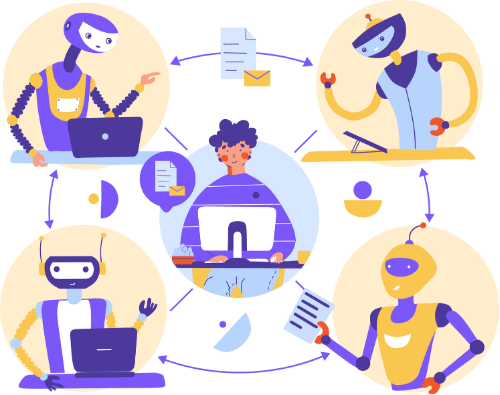How Agentic AI Is Redefining Workflow Automation in 2025
 Michael Johnson
Michael JohnsonIn 2025, the world of automation is undergoing a dramatic transformation. Businesses are no longer satisfied with simple rule-based systems or rigid task automation platforms. Enter Agentic AI the evolution of artificial intelligence that's not just reacting to inputs but proactively driving outcomes. With its autonomous, goal-driven nature, Agentic AI is now at the heart of next-gen workflow automation solutions across industries.

What Is Agentic AI?
Agentic AI refers to intelligent systems capable of initiating and executing tasks autonomously based on a clear understanding of goals, context, and environment. Unlike traditional automation tools that follow pre-programmed rules, Agentic AI makes decisions, adapts dynamically, and carries out complex, multi-step processes with minimal human intervention.
These AI agents think like digital employees: they set goals, plan tasks, coordinate across systems, and report on outcomes — revolutionizing how businesses manage workflows.
The Evolution of Workflow Automation
Historically, workflow automation has moved through several stages:
Basic Task Automation (e.g., macros, scripts)
Robotic Process Automation (RPA) — rule-based systems that mimic human actions.
AI-Powered Automation — integrating ML/NLP to enhance decision-making.
Agentic AI Automation (2025+) — fully autonomous agents managing entire workflows end-to-end.
This final stage marks a major leap, pushing businesses toward intelligent automation ecosystems.
Key Benefits of Agentic AI in Workflow Automation
1. Autonomous Decision-Making
Agentic AI agents can identify issues, evaluate options, and make decisions independently. For example, in an enterprise finance workflow, an agent can detect an anomaly, flag it, and recommend corrective actions all without human input.
2. Context-Aware Task Execution
Unlike traditional bots that break with even minor variations, Agentic AI understands changing contexts. It dynamically adapts to different scenarios, making it ideal for workflows that involve customer service, logistics, or HR operations.
3. Multi-System Coordination
These intelligent agents can communicate across platforms (ERP, CRM, email, databases), allowing seamless orchestration of complex workflows. For example, an agent in a sales workflow can coordinate between a CRM system, calendar, and email to book meetings, send follow-ups, and update records.
4. Proactive Optimization
Agentic AI doesn't just follow instructions — it learns and improves. Over time, agents can suggest new optimizations, remove bottlenecks, and redesign workflows for better outcomes.
5. Scalable Customization
Whether you’re in retail, healthcare, logistics, or finance, Agentic AI agents can be tailored to your specific workflow needs. A strong Agentic AI development company can craft bespoke agents suited for your operational environment.
Use Cases of Agentic AI in 2025
1. Customer Support Automation
Agentic AI handles end-to-end ticket resolution by gathering information, accessing databases, taking actions, and escalating only when necessary.
2. HR and Recruitment Workflows
From posting jobs to scheduling interviews and sending offer letters, AI agents can manage entire recruitment pipelines autonomously.
3. Financial Operations
Accounts payable, expense approval, and fraud detection are now being handled by agents that verify, match, and reconcile transactions in real time.
4. Supply Chain Management
AI agents monitor inventory levels, communicate with suppliers, and adjust delivery schedules dynamically to prevent delays or overstocking.
5. Marketing and Sales
Agentic AI drives personalized campaigns by analyzing customer data, sending emails, updating CRMs, and tracking conversion rates.
How Businesses Are Adopting Agentic AI
Forward-thinking businesses in 2025 are:
Partnering with Agentic AI development companies to build custom agents.
Redesigning legacy workflows with autonomous capabilities.
Embedding AI agents into app development and web development projects.
Integrating agents into custom software development frameworks for maximum flexibility.
The results? Greater efficiency, reduced operational costs, and improved user satisfaction.
Agentic AI vs Traditional Automation Tools
Feature | Traditional Automation | Agentic AI |
Task Execution | Rule-based | Goal-driven |
Adaptability | Low | High |
Initiative | Reactive | Proactive |
Learning | Static | Dynamic |
Scalability | Limited | Enterprise-grade |
Traditional tools are being phased out in favor of more intelligent, self-reliant agents that handle dynamic workflows.
Why 2025 Is the Year of Agentic AI
Several trends have converged to make Agentic AI mainstream:
Advances in AI development frameworks (e.g., AutoGPT, LangChain).
Cheaper cloud infrastructure, enabling real-time learning and data processing.
Demand for hyper-automation in the post-pandemic, hybrid-work world.
Enterprise focus on digital transformation and agile operations.
These shifts are creating massive demand for developers, consultants, and AI partners specializing in this space.
Building Agentic AI Workflows: What It Takes
1. Goal Definition
Every agent begins with a goal. For example: "Process all incoming invoices within 24 hours."
2. Environment Mapping
Agents need a full view of all systems, tools, and APIs involved in the workflow.
3. Action Planning
The agent determines the most efficient sequence of actions and subgoals to reach its target.
4. Execution & Monitoring
Agents carry out tasks and monitor progress, adjusting their plan as conditions change.
5. Learning & Optimization
Post-completion, the agent analyzes its performance to refine future behavior.
A reliable Agentic AI development company helps design, test, deploy, and monitor these agents to ensure continuous improvement.
Choosing the Right Partner for Agentic AI Development
To implement Agentic AI in your workflows, you’ll need an experienced team with:
Expertise in AI development and multi-agent architectures.
Familiarity with your business domain.
Experience in app development, web development, and custom software development.
Ability to build scalable, secure, and compliant solutions.
Not all AI is created equal. A specialized Agentic AI development company will deliver systems that evolve with your business.
Final Thoughts
As 2025 unfolds, Agentic AI is no longer a futuristic concept it’s the new standard in workflow automation. By integrating intelligent agents capable of independent action, businesses can achieve unparalleled efficiency, accuracy, and agility.
Whether you're streamlining customer service, HR, logistics, or finance, Agentic AI is transforming workflows into intelligent ecosystems. With the help of an expert Agentic AI development company, you can leapfrog traditional automation and future-proof your operations.
Subscribe to my newsletter
Read articles from Michael Johnson directly inside your inbox. Subscribe to the newsletter, and don't miss out.
Written by
